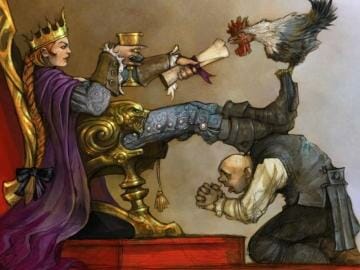Fable III
(Xbox 360)

Developer: Lionhead Studios
Publisher: Microsoft Game Studios
Platform: Xbox 360
Feeble
Peter Molyneux has earned a reputation for vastly overstating the emotional depth on offer in his Fable RPGs. Each time I wade a few hours into a new installment in the franchise, I feel like a kid who’s been promised his own personal moon landing, only to be taken for a spin in one of those coin-op space rockets that rumbles back and forth for 30 seconds before jerking to a halt. Molyneux promises a meaningful simulation of human interaction but forces us to communicate with NPC characters through wordless gestures such as muscle-flexing, belching, hand-shaking, etc. He promises we’ll have to make agonizing moral choices, but then trots out a series of binary, black-and-white dilemmas where he merely tips his hat to consequence by forcing us to sacrifice a bit of coin or villager approval if we opt for the dastardly course of action.
Fable III opens with the one of the more compelling moral dilemmas Molyneux has ever put to his audience. You play as either the prince or princess of the mythical kingdom of Albion. Your brother Logan sits the throne and has turned out to be a ruthless, unsympathetic tyrant. After you’ve spent several minutes cavorting around the castle grounds with your fiancé, your brother mocks your suitability as a potential ruler by abruptly forcing you to choose between sparing the life or your beloved or the instigators of a recent protest demonstration.
This scene feels designed to flummox people like myself who play moral choice games with all the unswerving righteousness of a Mormon boy scout. Because the choice could easily be recast as a decision between whom we’d prefer to kill. It’s the lifeboat condundrum, which of course has no winners, only survivors. When I spent too long mulling the decision, Logan began counting down to zero, informing me that indecision would mean both my fiancé and the group of anonymous protesters would face execution. Without telling you which party I ultimately spared, it was a dramatic moment, if only because Molyneux engineered the proposition to be a lose-lose.
Even though this twisted abuse of power reveals the full extent of Logan’s wickedness, sparking your flight from the castle and decision to mount a rebellion, I wanted my decision to matter more than it did. I wanted to feel my destiny shift in a manner that I could trace back to the specific party I spared. No such luck. The team at Lionhead could only be bothered demonstrating to players the anguish of condemning a straw man to death. To give the choice meaningful narrative resonance would require BioWare-style meticulousness in regard to plot branching. Molyneux and his team take the easy way out. Not just in this regard, but over and over throughout the course of Fable III.

Molyneux has spoken candidly about his desire to make Fable III accessible to a wider audience beyond the action-RPG enthusiast. I didn’t recoil upon hearing this. (I was too busy thanking God the game wasn’t being turned into a motion-control collection of sword-flailing minigames.) There are plenty of RPG gaming conventions that warrant a rethink. To the studio’s credit, Lionhead addresses the clumsy menu navigation headaches of Fable II by reimagining the inventory menu in a visual manner. When you hit “start” on the controller, instead of being taken to a series of branching inventory lists, you’re taken to a place called “The Sanctuary” instead. This is basically the Fable version of Batman’s bat cave. Want to change your outfit? Walk into your closet. Want to look at your achievements? They’re displayed on the wall in your treasury like pieces of collected artwork.
Fable II‘s sparkly breadcrumb trail makes an encore appearance so you don’t have to slavishly consult your map when figuring out which way to go. Your trust canine companion barks to alert you to buried goodies and out-of-the-way treasure chests, dashing along at your heels and panting affectionately. These are all helpful tools that iron out potential grind from the experience. But Lionhead gets carried away in its mission to reduce complexity and doesn’t quit until it’s stripped all challenge from Fable III. The resulting game feels like playing chess against a drooling lobotomy patient. When you die in battle, you respawn instantly without missing a curtailed heartbeat, losing nothing more than a handful of guild seals (the game’s version of experience points) and sustaining a bit of facial scarring. If Demon’s Souls mercilessly spanks your ass with a belt every time you die, Fable III gives you a ginger tap on the back of the hand that barely even registers.
Unfortunately, by jettisoning risk, Fable III also eliminates the player’s sense of reward. Molyneux makes a fundamental miscalculation here. Overcoming stress is a vital component of the human experience. Standing by her side as my real-world bride labored in agony to deliver our son, I felt a love for her that I can’t adequately distill into words. The experience cemented a bond between her and our son, whom she had worked so hard to bring into the world. People run marathons and climb mountains for a sip of adrenaline this potent. If a piece of jewelry can be bought at a discount, we instinctively question its value. When kids have to do chores and save their allowance to buy something, they guard it with a vengeance. This is just human nature.
-

-

-

-

-

-

-

-

-

-

-

-

-

-

-

-

-

-

-

-

-

-

-

-

-

-

-

-

-

-

-

-

-

-

-

-

-

-

-

-










































